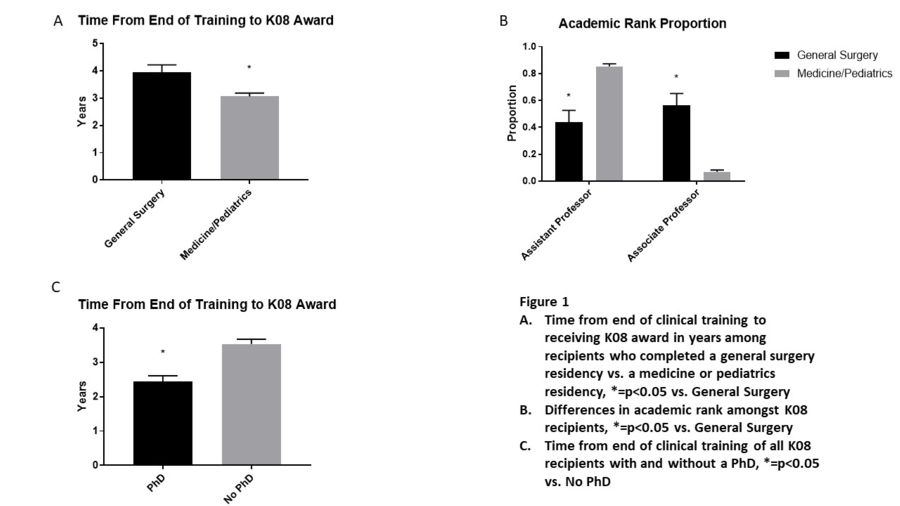PS1-04: DELAYED ACQUISITION OF THE NIH K08 MENTORED CAREER DEVELOPMENT AWARD: ARE SURGEONS BEHIND THE SCIENTIFIC EIGHT BALL?
Brian Hosfield, MD1, Quincy John, MD1, Kristen Seiler, MD2, Misty Good, MD2, Troy Markel, MD1; 1Indiana University, 2Washington University School of Medicine

Introduction: The NIH Career Development Award (K08) is given to faculty clinicians with a strong interest in scientific research. Research training during residency likely leads to the generation of significant preliminary data, and the timing of this training may be important to future success. General surgery residents complete their research training early in residency, typically after their second or third postgraduate year. Clinical training is then completed, which may be an additional 5-7 years. Medicine and pediatric residents, however, complete their research training during, or at the conclusion of their fellowship. Therefore, they may be better poised to obtain a K08 earlier in their faculty career than surgeon scientists. We hypothesized that: 1) surgeons would take longer to obtain a K08 than physicians trained in medicine or pediatrics, and 2) the acquisition of a PhD would allow clinicians to obtain a K08 more rapidly.
Methods: The NIH RePORTER database was queried for K08 awardees trained in medicine, pediatrics, or surgery from 2013-2017. Using an internet search, sex, number of degrees, residency completion date, and fellowship completion date were obtained. Data were tested for normality and compared using Mann-Whitney. p<0.05 was considered significant.
Results: The primary outcome was time from completion of all clinical training (including fellowship) to receiving a K08 award. K08 recipients who completed a general surgery residency took longer to obtain a K08 than those trained in medicine or pediatrics (general surgery=3.5 years (IQR=3-5), medicine/pediatrics=3 years (IQR=2-4, p=0.0060)). Because of this, surgeons also maintained a higher academic rank at the time of K08 acquisition compared to medicine or pediatrics faculty. Additionally, K08 recipients with an additional PhD degree received a K08 award more quickly than those without a PhD (PhD=2 years (IQR=1-3.5), no PhD=3 years (IQR=2-5, p=0.0001)).
Conclusions: Surgeons take longer to achieve a K08 award than their medicine and pediatrics counterparts. This may be due to the differences in the structure of residency research training. Further study is warranted to evaluate whether moving dedicated research time from the beginning of clinical training to the end would allow surgeons to more rapidly transition into a productive research career.
